Islanders in Chesapeake Bay face exile from rising seas
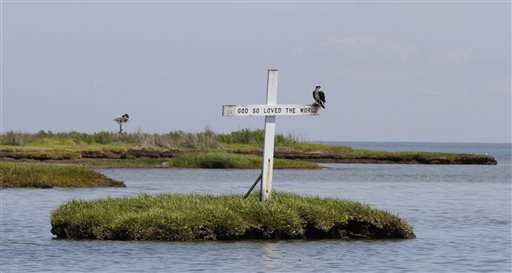
Islanders in the middle of the Chesapeake Bay could be among the first "climate change refugees" in the continental United States as rising seas claim their historic fishing village, a report released Thursday concludes.
The research published in the journal Scientific Reports says residents of steadily shrinking Tangier Island will have to abandon their fishing community in approximately 50 years.
As the U.N. climate talks continue an ocean away in Paris, "Tangier is kind of ground zero," said oceanographer David M. Schulte, lead author of the research.
The peer-reviewed research was funded by the U.S. Army Corps of Engineers, which has said millions in new infrastructure such as breakwaters could shield Tangier Island and extend its life.
Tangier's threatened existence is not news to islanders, who have seen their island and others nearby retreat through the decades. Uppards Island was abandoned nearly a century ago, but the skeletal remains of those who once lived there are occasionally coughed up during storms, such as Hurricane Sandy.
Carol Pruitt-Moore, a seventh generation Tangier islander, said the half-century lifespan forecast for Tangier seems rosy to her.
"I think it'll be less than 50 years," Pruitt-Moore said. "We are one storm away from being washed away or being forced to evacuate."
Low-lying Tangier is particularly susceptible to climate change and rising seas and the sinking of the bay—called subsidence. The sinking is a remnant of the last ice age and glaciers north of the bay. As the ice melted, the land rebounded, while the bay began to sink.
Tangier, Schulte said, "is just getting the double-whammy."
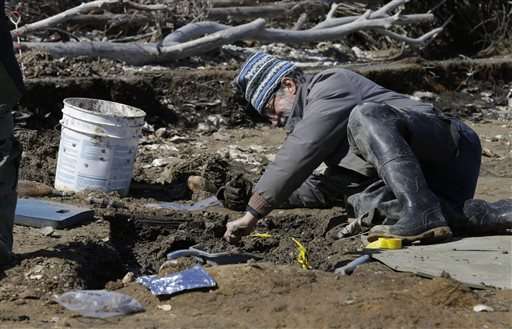
Approximately 700 people live on Tangier, nearly half its peak population. Island watermen are prodigious fishermen, hauling in a disproportionate amount of the bay's signature crabs and oysters.
Islanders get around on golf carts and homes are clustered atop ridges to keep them beyond the reach of rising waters. Graves have had to be interred and remains moved to avoid being swamped.
Because of its isolation, many residents have retained over centuries the linguistic traces of the island's settlers, primarily from Cornwall along England's southwest coast. Jamestown settler Capt. John Smith is believed to be the first white man to set foot on the island more than 400 years ago.
By the researchers' calculations, only one-third of the island's land mass remains from what was there in 1850.
Climate-change scientists have long predicted a limited future for Tangier Island, in part because the sinking land mass of the bay area atop rising seas. It has made places like Norfolk—home of the world's largest naval base—one of the most vulnerable to climate change in the U.S., behind only New Orleans.
The research published in Scientific Reports is the most definitive to date on Tangier Island, said Schulte, who co-authored the report with two other Corps scientists. "It's been studied but never to this detail," he said.
The authors analyzed maps and aerial photographs of the islands from 1850 through 2013 and constructed a model to predict the future lifespan of the islands.

At the current rate, one island near Tangier, called Goose, will be flooded by 2038. As for Tangier, it will be splintered into three low-lying uninhabitable marshes.
The report states the construction of breakwaters and other measures, at a cost of $30 million to $40 million, could extend Tangier's lifespan by perhaps another 50 years. The report adds that "climate change is upon us and that adaption to climate change is 'not optional.' "
"The Tangier Islands and the town are running out of time, and if no action is taken, the citizens of Tangier may become the first climate change refugees in the continental USA," the report concludes.
Pruitt-Moore said it's frustrating that projects to protect the island have not been funded.
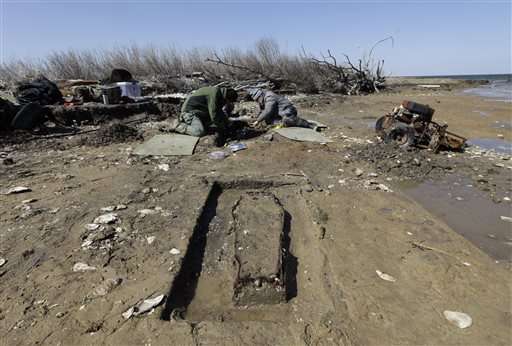
"There's so much history here," she said. "It's like America's forgotten us."
But she's not leaving Tangier anytime soon.
"I was born on the island and I've lived here for 53 years and I'll probably die here," she said.
-
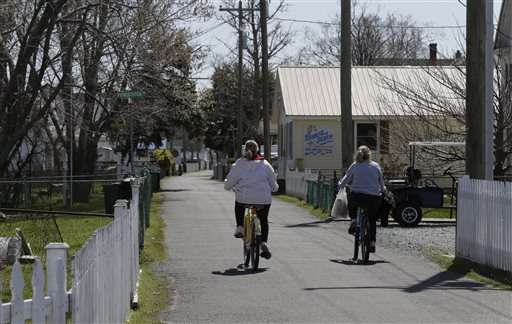
In this Wednesday April 3, 2013 file photo, two bicyclist ride down a street on Tangier Island, Va. The island and portions of the Virginia coast along Chesapeake Bay are especially vulnerable to climate change because of glaciers thousands of years ago that gouged out the 200-mile bay and a meteor a meteor that slammed into the lower bay 35 million years ago like an exclamation point. Researchers say the 500 or so residents of Tangier Island could be forced to move in 50 years, as rising seas claim their island at an alarming rate. (AP Photo/Steve Helber, File) -
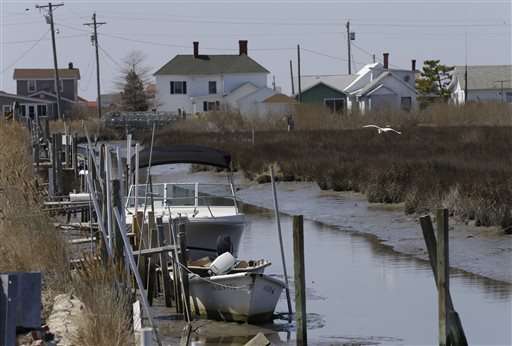
In this Wednesday April 3, 2013 file photo, low tide along a creek strands a few boats on Tangier Island, Va. The island and portions of the Virginia coast along Chesapeake Bay are especially vulnerable to climate change because of glaciers thousands of years ago that gouged out the 200-mile bay and a meteor a meteor that slammed into the lower bay 35 million years ago like an exclamation point. Researchers say the 500 or so residents of Tangier Island could be forced to move in 50 years, as rising seas claim their island at an alarming rate. (AP Photo/Steve Helber, File) -
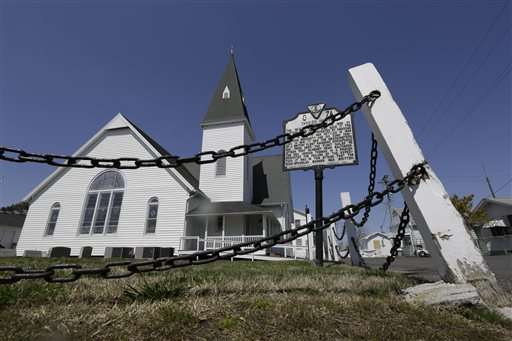
This Wednesday April 3, 2013 file photo shows a chain fence that surrounds the Swain Memorial Church on Tangier Island, Va. The island and portions of the Virginia coast along Chesapeake Bay are especially vulnerable to climate change because of glaciers thousands of years ago that gouged out the 200-mile bay and a meteor a meteor that slammed into the lower bay 35 million years ago like an exclamation point. (AP Photo/Steve Helber) -
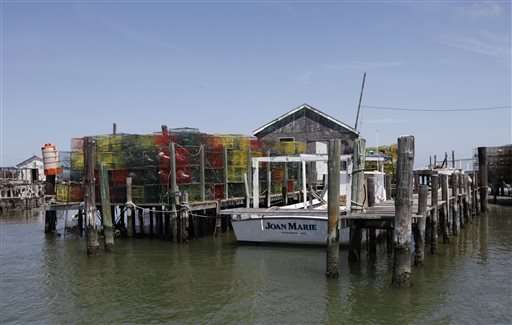
This photo taken on Sunday May 27, 2012, shows workboats at crab shacks that line the waterway in the harbor of Tangier Island, Va. Researchers say the 500 or so residents of Tangier Island could be forced to move in 50 years, as rising seas claim their island at an alarming rate. (AP Photo/Steve Helber) -
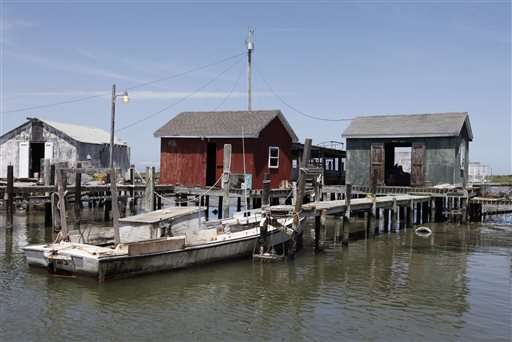
This photo taken on Sunday May 27, 2012, shows work boats at crab shacks that line the waterway in the harbor of Tangier Island, Va. Researchers say the 500 or so residents of Tangier Island could be forced to move in 50 years, as rising seas claim their island at an alarming rate. (AP Photo/Steve Helber)
Journal information: Scientific Reports
© 2015 The Associated Press. All rights reserved.




















